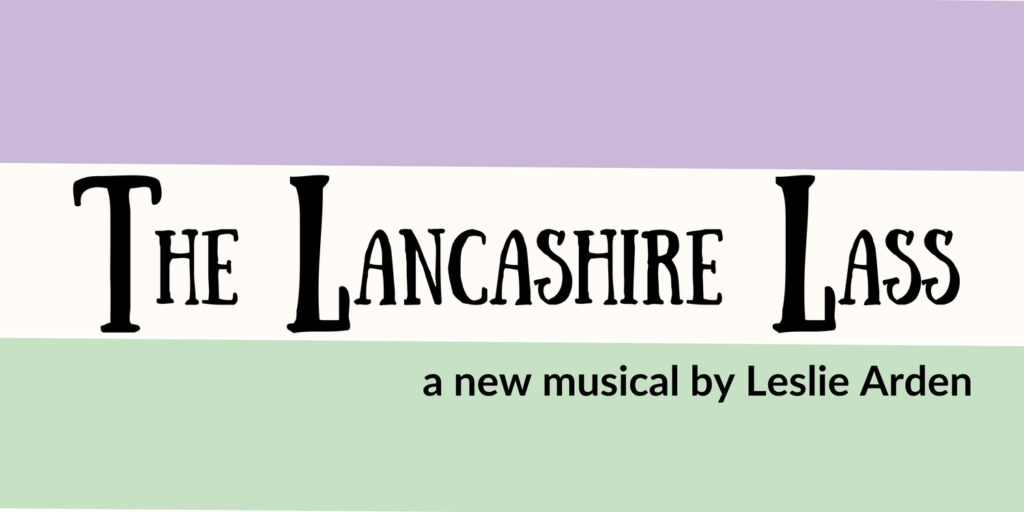I Don’t Know What I Want, But I Know I Want More: ‘The Lancashire Lass’

“VOTES FOR WOMEN” read the posters, props, and pre-show backdrop at the Kingston Grand Theatre. The Lancashire Lass is a new musical by composer/lyricist/librettist Leslie Arden. Commissioned by the Dan School of Drama and Music in 2019 and workshopped in 2021 and 2022, the show had its official premiere this year in the Watershed Festival. Directed by Tim Fort, The Lancashire Lass recounts the women’s suffrage movement in 20th-century Britain through the real-life characters of Annie Kenney (Melissa Morris) and Christabel Pankhurst (Brayah Pickard).
The story begins in 1905 when disgruntled mill worker Annie decides to attend a meeting of the Women’s Social and Political Union (WSPU). Annie is dazzled by the elegant—albeit condescending—Christabel and is recruited to speak on behalf of the WSPU. Annie’s ability to connect with working-class women is leveraged to draw support, but the union’s leadership soon finds that the working class cannot contribute sufficient funds to their cause. They must use “deeds, not words” (a line that is repeated throughout the musical) to get the attention of the middle and upper classes. The WSPU becomes increasingly militant, faces internal conflicts, and shifts strategies in the face of the First World War.
Morris is lively and animated as Annie. Pickard plays the manipulative Christabel with a cool, haughty demeanor. Michelle Kasaboski brings sensitivity to the role of Christabel’s sister Sylvia Pankhurst, and Susan Henley is commanding as their mother, WSPU leader Mrs. Emmeline Pankhurst. There are too many ensemble members to list all the strong performances, but I found Jessica Rosales particularly charming as Alice, and Mallory Brumm’s singing in the role of Emmeline Pethick-Lawrence is stunning.
The set, designed by Brian Frommer, is large and multi-leveled, transforming effectively into different rooms and outdoor spaces. Projections on an upstage screen use archival images and footage to evoke historical events, using the story’s figurative backdrop to create a literal one. The costumes, designed by Marianna Thomlison, are beautifully made—I love the puff sleeves and the green velvety coat Christabel wears. The props crew, headed by Clelia Scala, has done some wonderful work, and it was exciting to watch Annie paint a “VOTES FOR WOMEN” sign live on stage.
The Lancashire Lass aims to explore the grey areas in the women’s suffrage movement, but its characterization of the suffragettes drifts into the black-and-white. As the show progresses, the more radical women are depicted as cold-hearted and conniving—sometimes comically so—and those on the politically moderate side are positioned as the voice of reason. Annie is the only character who seems truly conflicted, and she spends more time singing about Christabel than pondering politics.
Early in Act I, I was intrigued by the behind-the-scenes WSPU drama, which illustrates how social movements can exacerbate class divisions and take advantage of their most vulnerable members. Annie’s working-class friends, who have the most to gain from suffrage, quickly disappear from the story as Annie is sent to London to open a new WSPU office. The rest of the show focuses on middle- and upper-class women, and it fails to convey a strong sense of how these women are oppressed.
“Votes for women!” is repeated so often that it’s still ringing in my ears, but the audience is seldom shown what these women have at stake. Worse, when they are targeted with violent retaliation by police and prison guards—including the force-feeding of hunger strikers—the blame is focused on the suffragettes. This may be accurate to historical framing, but the show makes minimal use of the opportunity to critique state violence—something that the more radical characters would surely have piped up about. This seems shortsighted coming from a musical that was developed in North America over the course of the early 2020s, when police violence has been such an enormous and urgent topic of discussion.
When I spoke with Leslie Arden, she said she was more interested in the human side of the story than in the movement itself, calling The Lancashire Lass a character study. I’m not sure this production realizes its full potential in this regard. Christabel comes across almost immediately as an imperious manipulator, which makes it hard to empathize with Annie’s infatuation. Meanwhile, Annie’s devotion takes over her personality, which doesn’t seem in line with the historical Annie Kenney—though it offers Morris the opportunity to sing a beautiful sad-woman-in-love song (a staple of the musical theatre genre). If the audience had more time, or reason, to become invested in Annie’s relationship with Christabel, the complexity—both emotional and political—of the situation may have come through more clearly.
While I sometimes found the musical’s message eyebrow-raising, the lyrics in The Lancashire Lass are generally clever and rhythmically satisfying. When Annie is accused of spitting on a police officer, she insists it was a pout—“a perfectly dry purse of the mouth.” (I was doubly amused to learn that this is based on a real event.) The music is catchy, and the band (directed by Darrell Christie) plays nimbly with its changing moods. When the ensemble sings, they move deftly between folk- and hymn-inspired stylings and contemporary choral chords.
Early in the show, Annie sings, “I don’t know what I want, but I know I want more.” I don’t know what I wanted, or expected, from a suffragette musical in 2023, but I know I’ll be humming the tunes for weeks to come. Although The Lancashire Lass strikes me as occasionally spitting—or at least pouting—in the face of activism, it is a lovely musical accomplishment with a lavish production.
More information about ‘The Lancashire Lass’ can be found here.
This article was edited on December 1st, 2023 to update formatting.